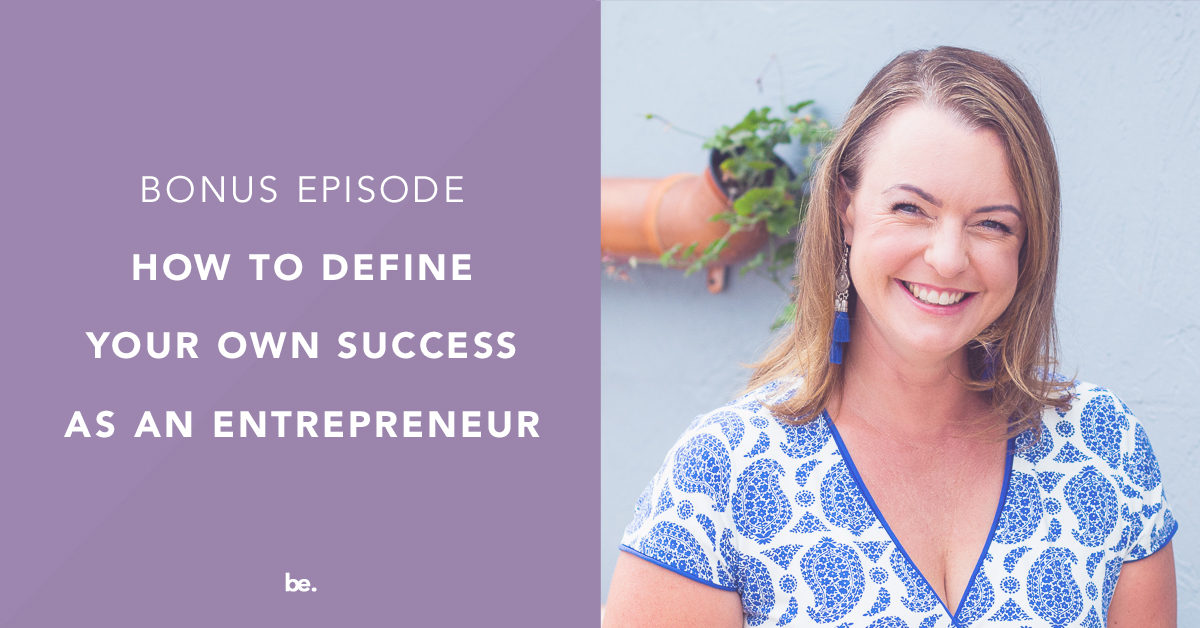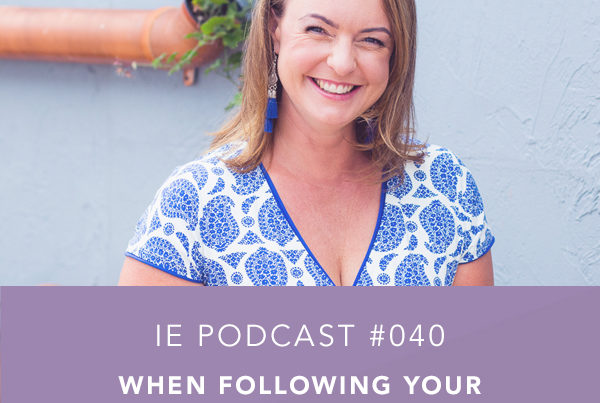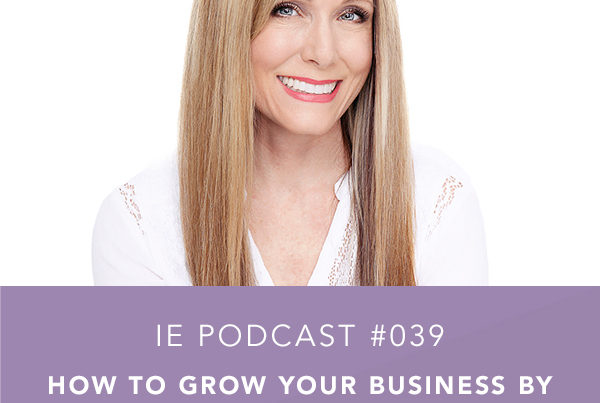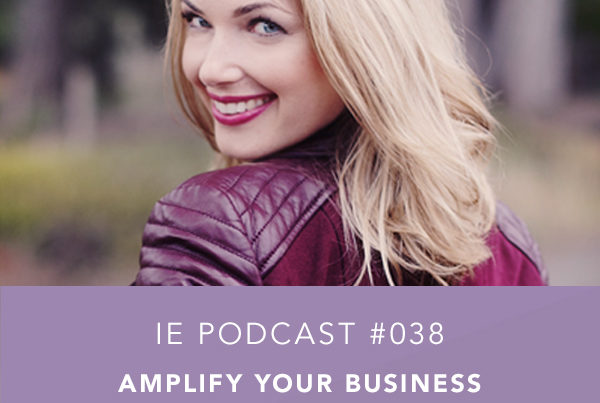
Want to help share the power of intuition + strategy in business? Subscribe and leave a review on iTunes. Here’s how.
What’s the first image that comes to mind when you hear the word “success”? Money, status, title? Whatever it is, I want you to think about who you picture when you think of these things. Now for the big question… is it you?
Many of us have been conditioned in our lives to view success in the traditional, masculine model. Achievement, climbing the ladder, fame, fortune, community status. There is nothing inherently wrong with any of these things, except that some of us have been chasing them without ever actually choosing them.
Then we wonder why we never seem to get “there”. Or when we do reach that success point, we feel underwhelmed, burned out and disappointed.
All of the intuitive entrepreneurs I’ve spoken with have one very clear thing in common – they all define their own version of success. This is what allows us, as intuitive entrepreneurs, to do business in a way that feels good. Operating according to your own definition of success creates flow in your business and helps you grow with ease.
Getting really clear on what success looks like for you is an absolute game changer.
So, how do you do that? I explain the exact steps to getting clarity on your personal success model in this special bonus episode of the Intuitive Entrepreneur podcast. Tune in, take action, and watch the shifts in your business start happening.
In this episode, you’ll hear about:
- Why we need to be open to different ways of viewing success
- The 5 steps to define your own version of success
- How I built my business around my personal values
- A powerful exercise to create your business vision
- How to stop comparing and start living your own version of success
Welcome to the Intuitive Entrepreneur Podcast. I'm your host, Brigit Esselmont, intuitive business strategist and mentor. As the founder of Biddy Tarot, I turned my love for tarot into an abundant seven figure business. The secret to my success, making intuition and strategy my entrepreneurial super power. And now I'm inviting you to do the same. In this weekly podcast, I'll be sharing advice, tools, and real life examples from some of the best intuitive entrepreneurs to show you how you can trust your intuition, align with your purpose, and create a positive impact through your work. Let's make it happen.
Hello and welcome to the Intuitive Entrepreneur Podcast. Now today is a special bonus episode. And this one is all about how do you define your success on your terms. So this is a theme that has been coming up a lot in the interviews that I've been doing for this particular podcast. As well as what I've seen in the research around other particularly female founders who are looking at new ways of defining success. So in more traditional ways, we often think of success as how much money you make, what your status is, who do you know, who do you have photos with, and so on, which is a very masculine version of success. Now I'm not saying that that's a wrong way of looking at success, but I think what we're starting to see a lot more of now is that there are other ways of defining success.
So for example, you're going to hear from Libby Crow in a few more episodes time. Now Libby is a seven figure business coach. And she's creating her own definition of success. So for her, it's not just about the numbers. But it's about having fun. It's letting her creative juices flow and being really authentic to who she really is. Now she still hits her numbers, don't get me wrong. But she's learned also how to really honour her deeper desires in the process.
Now Jadah Sellner is also a leader in this space. And Jadah talks a lot about love over metrics. And she is really pushing the boundaries around why are we spending all of our time looking just at things like customer service metrics, and data, and numbers, and so on. Yes, they're important, however, we need to look more holistically at the picture. We need to look at how do we love our customers. And what's underlying the deeper desires of our community and how can we meet that?
Marie Forleo, she defines success as liking who you are, what you do, and how you do it. And I believe that she has quoted Maya Angelou from with that quote. So it's really interesting. Liking who you are, what you do, and how you do it. And this goes way beyond just the numbers in the business.
And you're also going to hear from Maddy Moon in this podcast who talks about success as slowing down and being in tune with her feminine energy. And it's a really different way of looking at things because so often as business owners, we are encouraged to grow, grow, grow, grow, grow, right? But there's many people who are now starting to join this slow movement which is actually, you know what? Instead of doing all this kind of crazy, aggressive growth, how about we just slow things down, and create more spaciousness, and do things with ease?
So in this bonus episode, I'm going to talk about how to define your own version of success. Now in my view, it all starts with personal values. So for you to be able to define your version of success, it's really important that you identify your personal values and what's important to you. And it might be what's important to you in life in general, but also in the context of business.
Now for me, some of my top personal values are freedom, abundance, and excellence. So when I'm thinking about freedom and I'm thinking about success, then success is basically anything that allows me to have more personal freedom. So that might look like being able to live wherever I want. It might be about being able to work whenever I want and not being stuck in schedules. I know that I start to feel really weighed down when my calendar gets super full. Or I have to be showing up at things at certain times over and over. I can generally do one month ... Like a commitment per month. Say showing up for my programs, I love doing that. But anything that's more intensive, I start to feel like my personal value of freedom is being taken away. And likewise, I don't want to have an 80-hour work week. I find it fascinating to hear some entrepreneurs talking about the hustle, and I don't need to sleep, I just work forever. And I think, "No, that's not the way that I want to live." My definition of success is anything that enables freedom for me.
Now equally, abundance, it's a personal value for me. So success is then about having enough to never have to worry about money. And I think we are really blessed and privileged as a family that we don't have to set budgets. Although sometimes we do because sometimes it gets a little bit out of control. But we don't have to be in a place of thinking, "Well, I'd really like to have these $2.50 avocados this week, but I can't because I need to watch the budget." I love that we can be living from in a more abundant viewpoint. And obviously that means that the business needs to make money so that it can fuel our abundance at home. But ultimately, it's about never having to worry about having enough.
Now also abundance for me means that success is being able to share with others and be generous. So we are ... Or Biddy Tarot is a corporate sponsor of One Girl. And each year we make a significant donation to the organization that supports girls and young women getting educations in Africa. So I love that we have enough abundance flowing through the business so that we can be generous and that we can share with others. And also with the team, we can reward our team. We can have special retreats and adventures together. Yeah, that's important to me. So success is being able to create and feel abundance. And in this case, that does mean, oftentimes financial abundance. But also, I guess, spiritual abundance, energetic abundance, having an abundance of spaciousness in the business, which also feeds into the freedom.
Now the other personal value for me is excellence. And that means really doing my best and playing the A game. So I don't like to do things just half way. I like to go all the way. And even if I have plans in place when we're in the actual process. Like let's say we've got a launch plan, they are super awesome launch plans. And I want to know that when we're in launch, we are focused on excellence, which means that we can do whatever it takes to be playing at our best. So success for me is that we've played it our best. That I'm doing my absolute best work and being excellent in what I do. Also translates to things like working in my zone of genius. The things that I do so very well that contribute value, that add value. That's incredibly important to me.
So it really does start with your personal values. And I encourage you to think about what are your top three personal values. Or at least, what are three personal values that you can think of right now that are important to you? And then what does that look like in terms of success? How do your personal values influence your version of success?
Now the other thing that becomes interesting with personal values is while we know that businesses ... In a capitalist society, a business really exists to make revenue and make profit at a very basic fundamental level. But here's the thing. So profit, yes, is definitely important. And it's what enables freedom and abundance for me. And it also is a product of my excellence. But here's the thing. I'm not going to chase profit at the expense of my personal values. So if it meant that I could make another million dollars in profit but I had to work 80 hours a week on tight schedules and so on, then it's a no for me. So my values do come first before profit. And I think this is an important thing with success and defining success is we've got to come back to what is really important to us, not just what's expected of us. And we'll touch on that in a little bit.
All right, so here's the second thing. Envision what you want to create in the next three to five years. And this will really help you define success on your own terms. So envision what you want to create in the next three to five years. So fast forward three years from now and start to think about and feel what is it that you'll be doing? Where are you? What kind of work are you doing? Who are you serving? What impact are you having? What change will you make in your life? What changes will you make for others or help support others to make for themselves? And also how do you want to feel in three year's time? Danielle LaPorte talks a lot about how you want to feel and instead of having set goals, look at how it is that you really want to feel. So how do you want to feel in the next three to five years?
Now this is an exercise that can take a good couple of hours if you want to get really in-depth with it or at least 10, 15 minutes in a journal. And it's actually something that I do quite frequently. You would think, "Okay, well this is kind of big thinking. Maybe I should only do it once a year, at the start of the year, or whenever I do my business planning, what have you." But I actually find it quite powerful to do this on a much more regular basis. Because each time I feel into that three year or five year vision, it just changes a little bit. And each time, it unfolds in a different way. So maybe that first time, I think that this is what I want. But by the second or the third time, I'm starting to really go, "Is that what I really, really want? Or is there something else in here?"
I also think that sometimes we can be a bit blinked or limited too in that we're only able to see the next three years from where we are right now. So if you don't necessarily ... If you're lacking a bit of a growth mindset or you can't feel into your potential, it can be a bit limiting. And even so, even if you are able to feel into your potential, it's often so much more than you could ever imagine. So really give yourself permission to lean into that three-year vision and see that anything is possible.
And here's the other thing that will happen too, you'll start to uncover your mission. What it is that you are here to do and what changes you're here to make. And I believe through my own personal experience is that this mission does start to ... It changes, it evolves. You can feel really aligned to a vision or mission and then in a few years, you might start to pivot and you move into a different vision or mission. So be ready, and flexible, and adaptable for that to possibly happen.
All right, so now that you have uncovered your personal values and you've felt into the next three years, now it's about getting specific. So ask yourself, what does success look like to me? How will I know that I am successful? So what does success look like to me? Well, for me, again, freedom. It's doing my best. It is having days that eight hour work days that may be like three or four work hours during the day. And then the rest of the day I might be going out for a walk and connecting with nature or hanging out with my kids if they're in a good mood. And talk about unconditional love. Anyway, I was side tracking. So yeah, I'd get clear on what does success look like to me and how will I know that I'm successful? And what is it that I need to do today in order for success to flow?
So for me, freedom, I'm not feeling particularly free at the moment because I have got quite a tight schedule. So for me, maybe what I need to do is free up more space in my calendar, schedule some more days off or half days. I quite like doing a half day in the morning and then a half day off. I feel like at least I've done some work today and then I can go off and enjoy the rest of the day. For abundance, maybe I need to be more focused on growth strategy so that the abundance can continue to flow. Excellence, for that to be happening, I may need more dedicated work time where I can work in blocks on the deep work.
I think it's Cal Newport, excellent book called Deep Work. He talks about, yeah, the need to have at least a good three or four hours so that you can go deep into one particular project. So often we are sort of spinning our wheels trying to do multiple things at once, multi-task, good small tasks, you name it. And we don't actually get to the core of what we really want to do. So when it comes to excellence as part of a success framework, for me, that would mean more of this dedicated work time with less interruption or less meetings and so on.
All right, so now that you're clear about what it is that you want to create in terms of success, then you can start to visualize your success every day. So in the mornings before you get up out of bed or maybe during your meditation in the morning, start the day with a visualization where you get to create everything that you most desire. So you might visualize what it's going to look like and feel like in 12 month's time, or three years, or five years.
So really feel into that vision every single day. And this is where you want to really experience that feeling. So feel it in your body. You feel a sensation in your body. You might see it as a color or a shape. You might feel the emotion that goes with it. Maybe there's a taste, a smell, a sensation on your skin, the warmth of the sun. Whatever it might be, really dial it up so this experience feels very real. Because as you do these kinds of success visualizations, they start to almost trick the mind that this is already happening. It's already in process. It's already here. And that is what enables you to really allow the success to come through.
Now something that often comes up is that we think, "Oh, yes. I really want freedom as part of my success framework," but then you hear about the next entrepreneur who's just created a $10 million business. And you think, "Oh my goodness, maybe that's what I should be doing." Or maybe you have people around you, loved ones, family members, friends who think that you need to be doing things in a certain way to be successful. Maybe others think that you need to be in high growth mode when your whole body and whole intuition is saying, "No, we need to slow down. We need to just relax and settle into this." So I want you to be very aware of any time that creeps up that someone else's expectations or definition of success starts to influence you and maybe potentially steering you off course.
I remember I had this ... a job interview right back when I was in my early 20s. Almost out of uni. Well, no. I was about a couple years out of uni, university, sorry. And I was interviewing for a management consulting role. And barely 23, 24 sitting in front of the managing director. And he asks me, "So where do you see yourself in five years?" Absolutely expecting that I would say something like, "Oh, I want to be a general manager of HR," or, "I want to be an executive." And I sat there for a little bit and I thought, "Well, what do I really want in the next five years?" And finally I said to him, "You know what? I don't know. All I know is that I want to be happy. And that's it." And he was like, "What? Is that ... Do you just want to be happy? You don't want to be an executive level senior person, blah, blah, partner in the firm?" I'm like, "No, actually. I don't know what it's going to turn out like. I just know that I need to be happy. And I will know what that happiness looks like at the time."
So I share this because sometimes we can get really caught up in what other people expect of us and what other people expect that success should look like for us. But we really need to come back to what's going to make us happy, and what is fulfilling for us, and what aligns with our personal values, which is really important.
Now there's another book that I want to recommend. I've just talked about Cal Newport and the Deep Work. Arianna Huffington wrote the book, Thrive, which is subtitled, The Third Metric to Redefining Success and Creating a Life. And if you haven't read this book, I highly recommend it. It's wonderful for helping you to, I think really step into your feminine leadership, your intuitive leadership. And really start to assess what is right for me?
And we spoke with Susan Hyatt, well I spoke with Susan Hyatt, you got to listen, just before this episode. And that was also an undercurrent in Susan's book, BARE. It's very much about how do we just let go of these cultural sort of norms, conditioning, what we think we should be doing to be successful? To be skinny? To be fit? Whatever it might be. Muscular, I don't know. But what is it that actually is right for us? What do we as individuals really want? And so I want you to take that away and think about what is your version of success in your business and in your life?
So I would love to hear from you. Come over to Instagram. You'll find me at Brigit Esselmont. So it's B-R-I-G-I-T-E-double S-E-L-M-O-N-T. Or just I'm pretty sure you'll find me at just if you go at Brigit Ess, E-double S. Anyway, I need a much better, a much more simpler handle, don't I? So come and join me over at Instagram and I'd love for you to DM me with your version of success. Or even better, post it in your Instagram story and do an at Brigit Esselmont and I'd love to hear how this has landed for you and how you see your version of success opening and unfolding for you.
Thank you for joining me for today's episode of the Intuitive Entrepreneur Podcast. If you love this episode, please leave an honest rating and review on iTunes. It really helps to get the word out. And of course, I read every single comment. Now if you're an intuitive entrepreneur with a desire to build a business fueled by purpose, passion, and profit, then you're invited to join me and an intimate group of female business owners in the Intuitive Entrepreneurs Mastermind. All you need to do is add your name to the wait list and you'll be the first to know when applications are open. So head on over to brigit.me/mastermind. That's B-R-I-G-I-T.me/mastermind. I'll see you there and bye for now.
Resources and Links Mentioned:
Want to create a highly successful business that is deeply rewarding and fulfilling, whilst having a huge impact on the people that you serve? Then subscribe for more high-value conversations on the Intuitive Entrepreneur Podcast.
Much Love,




